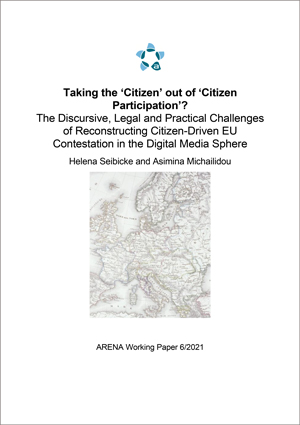 To what extent is EU contestation on social and digital news media driven by citizens? Is political debate on social media a participatory affair, where citizens get to have a say and be exposed to other non-institutional, non-elite actor views? We address these questions as part of our BENCHMARK study of Brexit and the legitimation of an EEA-type solution in the post-Brexit referendum period of 2016–2019. Our study focuses on UK public discourse on a possible EEA solution, and reactions such discourse may have triggered in two EU associated countries, Norway and Switzerland. We thus take a broad European perspective of EU contestation that is not strictly confined within the EU public sphere(s), but which nevertheless has implications for the public legitimation of the EU polity both within its borders and externally. Further drawing on the experience of our empirical research, we contribute to the discussion about the discursive, legal and practical challenges of locating, classifying and publishing citizens’ views of the EU in digital media discourse. We start with the discursive challenge of locating and identifying citizens’ voices in social and news media discourse. Whose voice is heard and how do we as researchers contribute to amplifying these voices? The second set of challenges pertains to the legal regulatory framework guiding research ethics on personal data and cuts across the academic debate on what constitutes ‘public’ discourse in the digital public sphere. The third set of challenges is practical, but of no less consequence. Here, we bring in the issue of marketisation of the public sphere and of the digital commons, and how these processes affect the ethics, as well as the feasibility and reliability of digital public sphere analysis. Thereby, we illustrate that barriers to content analysis can make data collection practically challenging, feeding in turn dilemmas with data reliability and research ethics.
To what extent is EU contestation on social and digital news media driven by citizens? Is political debate on social media a participatory affair, where citizens get to have a say and be exposed to other non-institutional, non-elite actor views? We address these questions as part of our BENCHMARK study of Brexit and the legitimation of an EEA-type solution in the post-Brexit referendum period of 2016–2019. Our study focuses on UK public discourse on a possible EEA solution, and reactions such discourse may have triggered in two EU associated countries, Norway and Switzerland. We thus take a broad European perspective of EU contestation that is not strictly confined within the EU public sphere(s), but which nevertheless has implications for the public legitimation of the EU polity both within its borders and externally. Further drawing on the experience of our empirical research, we contribute to the discussion about the discursive, legal and practical challenges of locating, classifying and publishing citizens’ views of the EU in digital media discourse. We start with the discursive challenge of locating and identifying citizens’ voices in social and news media discourse. Whose voice is heard and how do we as researchers contribute to amplifying these voices? The second set of challenges pertains to the legal regulatory framework guiding research ethics on personal data and cuts across the academic debate on what constitutes ‘public’ discourse in the digital public sphere. The third set of challenges is practical, but of no less consequence. Here, we bring in the issue of marketisation of the public sphere and of the digital commons, and how these processes affect the ethics, as well as the feasibility and reliability of digital public sphere analysis. Thereby, we illustrate that barriers to content analysis can make data collection practically challenging, feeding in turn dilemmas with data reliability and research ethics.
Taking the ‘Citizen’ out of ‘Citizen Participation’? The Discursive, Legal, and Practical Challenges of Reconstructing Citizen-Driven EU Contestation in the Digital Media Sphere
ARENA Working Paper 6/2021 (pdf)
Helena Seibicke and Asimina Michailidou
Published June 1, 2021 2:00 PM
- Last modified Nov. 3, 2021 11:33 AM